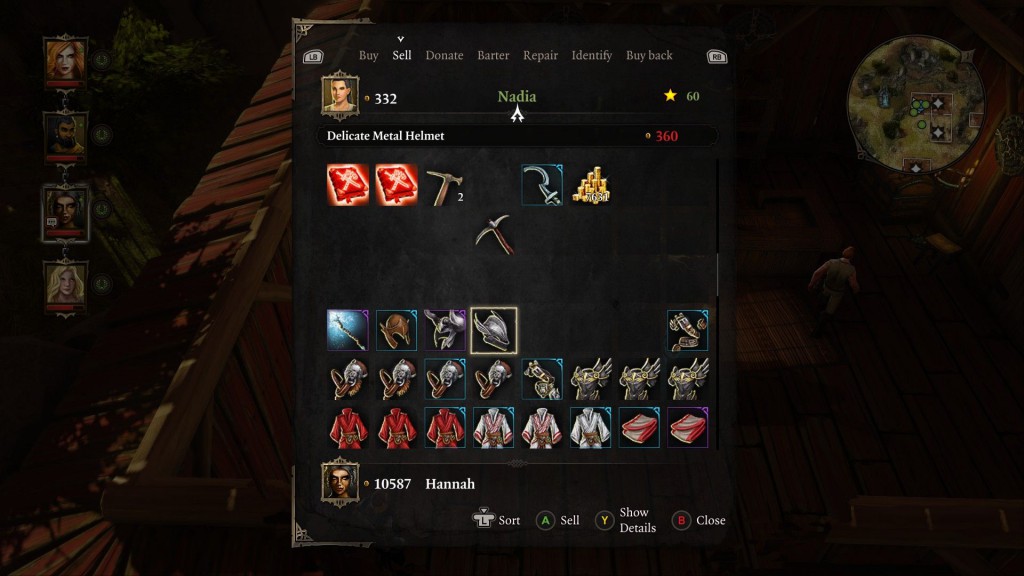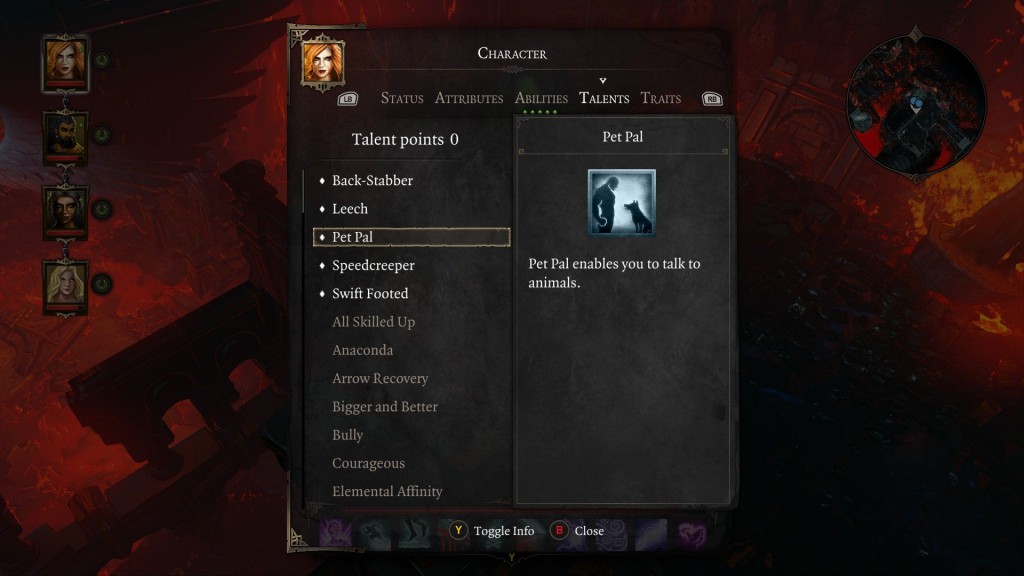I have invested a lot of time in Divinity: Original Sin - specifically the Enhanced Edition, which I reviewed for the blog previously. There are a lot of lessons I learned along the way which I wish I'd known far earlier in my quest. If you're stuck or just getting started in Divinity: Original Sin, this is the guide for you!
Generally Useful Tricks
First, save often. F5 is mapped to "Quick Save" even if you're using a controller on PC. If you're on console, you probably will have to go to the pause menu. Any way you slice it, save save save!
The difficulty of the combat is quite uneven, and it's not unusual to bumble your way into some really hard fights early in the game if you're not careful. I tend to save every time I change equipment, if I see enemies up ahead, after a fight, etc.
Laying down in a bed will heal you pretty fast, which is useful whenever you're coming back to town after a long stint in the wilderness.

Clicking the right stick (ie, R3) will show you items laying on the floor, and sometimes it will show you other interactive things like levers, switches, chests, etc. Leaving it on all the time might block targets in combat, so be sure to switch it off if you're having trouble seeing.
Once you have invisibility, steal everything. Especially paintings and gold items (cups, etc). As long as nobody sees you, the item is permanently yours and can be sold to any vendor. You can even steal stuff from someone and then sell it back to them again!
Items are a Girl's Best Friend

You can pick up almost anything in Original Sin, but there are a few things you might want to hold at all times:
- Shovel - Lots of areas have dig spots where you can find hidden treasure, or extra fights for experience. There's a shovel on the beach where you first start, and they're scattered about as you progress through the game.
- Candles - Lit candles can be thrown to light poisonous surfaces which makes them explode. This can be useful in and out of combat, to either clear bad environmental conditions or to ignite your enemies.
- Boxes - Boxes, crates, barrels, etc can be used to flip switches or block floor traps. You can pick these up and carry them in your inventory, although often you'll find a supply nearby when you need them. Since they can be destroyed (errant fireballs FTL) having a couple on hand can save some trekking about.
- Lockpicks - Locked doors and chests abound, so having a stack of lockpicks available will get you more loot faster. You can buy them at the alchemy shop in Cyseal.
- Trap Disarm Kits - Lots of traps are everywhere, so stock up on these and use them when you can't evade traps with your wits or detonate them with a ranged attack.
- Repair Hammer - This isn't consumed when used, and can repair your gear without paying. Definitely worth it!
- Identifying Glass - Another item that isn't consumed when using it, it requires Loremaster skill, but again this can save you tons of money.
- Teleportation Pyramids - This set of pyramids can be found early on in Cyseal, and you can throw one and use the other to teleport to it. This can get you past certain blockades, or let one sneaky party member scout ahead and bring the rest of the party past a tricky area.
- Locked Chests - if you come across a chest and don't know how to open it, just pick it up! You can also send it to your Homestead once you've unlocked that ability. Later, when you find the key, it's much easier to go to your homestead to open it than it is to go traipsing around looking for the chest again.
Many items can be sold for cash, but much like other RPGs like Diablo or Skyrim, most items in Divinity: Original Sin aren't worth carrying due to low sell prices. Enchanted items are almost always worth it, and later in the game even basic armor and weapons can be sold for quite a bit.
Optimizing Your Party
Stats
The primary stats are fairly well explained by the game - each one generally corresponds to some clear effect on your character. As you put points into a stat, the secondary stats will automatically recompute, which makes it easy to see if you're getting the effect you intend.
I would suggest trying to focus on a single stat (or maybe 2) per character. The three key stats are Strength, Intelligence, and Dexterity, with the rest not having as big an impact on your character as those do. High scores in at least one of these stats are nigh required for equipment and skill use.
The best skills tend to require 13 points in their respective primary stats. For instance, Invulnerability in the Witchcraft tree requires 13 intelligence minimum. Past this point there are still benefits in terms of skill effectiveness and cooldown reductions.
Abilities
The way ability points work is not well explained. You need to spend the same number of points as the rank you're trying to get. For instance, if you want to upgrade your Willpower from rank 2 to rank 3, that will cost you 3 ability points.

It's a good idea to save up your ability points and try to focus on just one or maybe two ability trees at once. Don't go crazy putting 1 point into everything, or you'll be seriously underpowered.
Many of the weapon abilities are kind of lame, only offering moderate damage or crit chance boosts. There are also some quite useless abilities, in my opinion. Pickpocketing and sneak, for example, don't really benefit you that much considering how easy it is to go invisible and steal things.
When it comes to the "skill" abilities, I suggest not spending points on these until you find a skill book you want to read, but can't. Otherwise, you'll end up being a master in some lame skill tree with no skills to show for it. Skill books are available at a wide variety of vendors, so try to trade with everyone you can to find them all.
Scoundrel is probably my favorite skill set, and Man-At-Arms is probably my least favorite. The magic skill sets all have their own advantages, so it's hard to pick between them. Expert Marksman has some decent skills, and is pretty much the only option for ranged non-magic users.
Try to have everyone know a skill that summons a familiar. Each character can summon their own, and having 8 targets and turns per round is a big help when you're outnumbered or up against a tricky foe.
Another thing to try to find is a skill that does area damage for everyone. Grenades and area-of-effect arrows are decent in a pinch, but having a renewable skill for everyone to cast when the enemies bunch up can be a lifesaver.
If you can get healing on each character, that's a big boost too. Many of the skill sets have some form of healing, so find one that works with your primary attribute.
There are some skills that I'd consider required:
- Rain (Hydrosophist Rank 1) - Rain clears many environmental hazards like burning or poisonous floors. It also extinguishes all characters who are burning. It's just an all-around useful skill to have.
- Invisibility (Scoundrel Rank 1 or Aerothurge Rank 2) - Being invisible means you don't have to worry about sneaking whatsoever. Just go invisible and rob or evade to your heart's content! Do note that invisibility does NOT effect pickpocketing.
- Teleportation (Aerothurge Rank 1 or Scoundrel Rank 3) - There are times where you need to get past a gap in the floor, and the easiest way to do this is via teleportation.
- Regeneration (Hydrosophist Rank 1) - There are potions of healing, but Regeneration is cheaper and more effective, especially out of combat.
Talents
Talents in Divinity: Original Sin don't tend to be that useful on the whole. Most carry advantages and disadvantages, or they require maxing out a particular skill tree before you can unlock them.

One talent I'd suggest getting on one of your two main characters is "Pet Pal." There are some quests which can only be accessed by having this talent, and talking to animals (especially rats) can give you clues that make some of the puzzles a bit less of a chore. Only the protagonists can take this talent!
Another one that I got a lot of use out of is Leech. Leech heals you when you're standing in blood, and getting hit tends to make some blood fly. Thus, you'll get a little healing most of the time when you get hit!
Mastering the Environment
We've already kind of covered some parts of this - for instance, carrying and throwing boxes for trap disarming, plus going invisible, teleporting, etc. Whenever you get to a situation where traversal seems difficult or impossible, try using your skills and items!
It's also important to keep track of the environment during combat. For instance, you can teleport enemies into hostile areas (like lava) to damage or even kill them instantly.
There are many different combos out there, but early on you'll probably get a lot of use out of Water + Shock to create electrified puddles. Just be careful of Poison + Fire, which creates explosions.
There's also a temperature spectrum from "frozen" to "chilled" to normal, then "warm" and "burning." If you're frozen and get hit with a fire spell, you'll thaw out but probably won't burn. If you're wet, you're more susceptible to freezing. It sounds kind of confusing, and it kind of is, but with practice you'll get the hang of managing it.
While generally your followers will avoid damage floors outside of combat, if you don't explicitly route them around them during combat, they'll walk right over them. Making even small movements on damage floors will cause new damage to be applied, so watch out! Sometimes it's better just to hold still and wait for the effect to dissipate, or cast a spell that removes it.